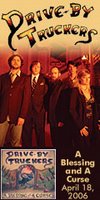
When Allison Moorer asked to leave Universal Records after three studio albums, it was unclear what her future might hold. Though always championed by record exec and Nashville institution Tony Brown, the writing was on the wall nearly from Day One. Moorer’s first two records walked the edge between traditional country and polished production, but despite having stunning looks to match her killer pipes, Moorer failed to impact the Country charts. Her third record found her branching out and embracing her Beatle-esque roots, and unsurprisingly it went nowhere. Anyone who’s ever seen Moorer in concert becomes a lifelong fan, but I’d imagine that group couldn’t fill the front row at a Toby Keith concert in any given city.
No one in their right mind believes that commercial success equals artistic success. However, you’d be naïve to think that the distribution arms of major recording labels aren’t still important (Wal-mart, after all, sells about a quarter of the nation’s music). So I’m sure it was with some trepidation that Moorer herself approached Universal to be set free. Unlike many artists, however, she quickly signed a deal with Sugar Hill Records, an impressive indie label with bluegrass roots and larger ambitions. Within weeks, Moorer hit the studio with her favorite producer (R.S. Field) and a small, committed group of musicians. What she emerged with was a statement about the loss of faith, whether faith in a music career or faith in God. As usual, Moorer and her songwriting partner (slash-husband) Doyle Primm put together a set of lyrics that challenge the singer to look at herself clearly in the mirror, and often prompt the listener to do the same. Topics range from the painfully self-referential (“Once Upon A Time She Said”) to the just downright painful (the title track). The common thread is a survivor’s view of the world, from an artist who clearly understands too much about it. It’s tough, grim stuff at times, but certainly not without its transcendent moments.
Those come courtesy of her band, who release Moorer’s inner-Crazy Horse to great effect. Moorer has found a terrific guitar sideman in Adam Landry and R.S. Field lays down some exceptional drum parts (especially considering he was coaxed out of drumming retirement by Moorer and Primm). Many fans were not terribly surprised by the shift in musical direction since Neil Young and the Stones have always been not-too-subtle influences of hers.
Moorer has generally stuck to the traditional country themes of love gone wrong (albeit never with a predictable or cornpone approach), but on
The Duel, Moorer gets to explore less country music-friendly topics. For instance, you won’t find this opening lyric (from title track) on any country radio station EVER:
“In this cemetery mist / stands a newborn atheist.”
Likewise, Moorer provides a smart, metaphorical retort to the flag-waving red state mentality that seems to grip Country music by the balls. “All Aboard” is simple and steeped in irony without sounding like so much of the shrill, liberal-minded screeds released by dozens of artists this year. “Once Upon A Time She Said” is the kind of naked confessional that makes you hope it’s fictional. But Moorer’s stunning delivery and powerful arrangement let you know that there is very little distance separating this song from reality.
The Duel is Allison Moorer’s finest achievement, and that is no slight compliment in my book. Her second album
The Hardest Part was the perhaps the toughest country record to deal with heartbreak released in the last 10 years. That record seemed to be directed at a person;
The Duel seems to be directed at life, love, God, the music industry – you name it. And that’s the point: we’ve all been there, and we’re all going to be there again at some point. But Moorer knows how to brighten the darkest of corners. She has a voice better suited to melting steel than selling records. She has surrounded herself not just with talented musicians but with brothers in arms. It should surprise no one that her primary musical partner is also her life partner. There’s just so little daylight between singer and the song. Is Allison Moorer really “Melancholy Polly?” You’d hope for her sake, no. But who are we kidding? Allison Moorer is the real fuckin’ deal, folks, from guitar string to gut.



















